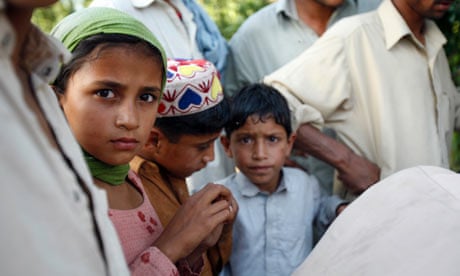The refugees hurried down the deserted road in the searing midday heat, their suitcases clattering on the tank-scarred tarmac. Waving white flags, they crossed one ghostly village after another. Shuttered shops, destroyed buildings, stray dogs panting in the shade were all passed as the group veered around craters in the road.
A warplane hissed overhead, the crump of artillery shattered the silence. At a checkpoint nervy soldiers searched the group – about two dozen men, children and burkha-clad women – at gunpoint. "We have to get out," said Muhammad Tahir, a burly man sheltering under a black umbrella. "No food, no electricity, no gas – we can't take it any more."
Pakistan's army is winning the war in Swat, the tourist idyll turned Taliban fortress. After seven weeks of battle the militants have been driven from their strongholds.
The government says that total victory is imminent. But military success has come at a human price. More than one million people have fled Swat, according to revised government figures. And inside the valley, hidden from the world, a second crisis is brewing.
Tens of thousands of people – nobody is sure how many – have remained in Swat through the fighting, stuck between the army and militants and straining under a strict military curfew.
Last week the Guardian spent three days in Swat, slipping in through rough mountain roads controlled by neither Taliban nor army. The route was littered with the debris of war – a levelled mosque, white smoke billowing from the forests and a destroyed police station at the peak of a desolate mountain pass, blue uniforms strewn outside.
Inside Swat, where the curfew was in force, soldiers waved civilians off the road. But it was not applied in the fields, where farmers toiled furiously to save their crops from ruin.
"The fields cannot hold them any longer. We have to do it now," said Muhammad Sher, a squat man in a white turban who wrenched onions from his riverside plot. His 23-year-old nephew, Razaullah, lifted his shirt to reveal a shoulder wound.
"The army shot me during the curfew," he said. "No doctor was available so a neighbour extracted the bullet."
A jet fighter zipped overhead followed by an explosion that boomed across the valley. Sher Muhammad pointed across the flowing water. "Taliban territory," he said.
The river Swat is the frontline of the conflict. The army controls the east bank; the black-turbaned militants hold out on the far side.
But they are crumbling: the army captured several key villages this week. Before torching the school at Manyar, further up the valley, they left a glimpse of their mindset in the form of graffiti-scrawled blackboards. Childish drawings depicted helicopters, tanks, and crossed scimitars, the Taliban symbol. "The Pakistan army are queers," read one message.
The army estimates that 10-20% of the population remains in most villages. Life under curfew is increasingly difficult. No electricity means no fridges, no mobile phones, and no fans to still the summer heat. But, with shops closed or emptying, the most urgent need is food.
But the army is proud of its progress. On the edge of Mingora, the largest city in Swat, Lieutenant Colonel Aziz relaxed in a classroom of a school turned military base. His regimental flag was draped over a desk; sunlight streamed through a rocket hole in the wall. He laughed at the Taliban. "They're getting desperate. We hear them on the radio, cussing us as non-Muslims," he said.
Brigadier Javed Bukhari, who leads fighting in the southern part of Swat, arrived. "The will of the people was with us," he said.
Bukhari said his forces had killed about 100 Taliban fighters – a figure at variance with official claims of 1,300 deaths across the valley.
Both officers boasted of causing few civilian casualties. They were less kind to the Taliban. After sweeping through Nawagai village, soldiers flung the corpses of Taliban fighters on the road, where they were later eaten by dogs.
"We left the bodies there so people would get the message that these guys are not coming back," he said.
It was an apparent breach of the customary rules of war, which require combatants to "take all possible measures to prevent the dead from being despoiled".
But the Taliban leadership, guided by the cleric Maulana Fazlullah, remains at large. Some residents said they had fled to Afghanistan; many others said the insurgency would only end with their death.
Many Pakistanis point to the Taliban's sophistication – soldiers have discovered bomb manuals, chequebooks and bundles of dollars and euros – as evidence of the "foreign hand", a euphemism for everything from al-Qaida to Indian intelligence and the CIA.
But frontline officers admit it is also the result of Pakistan's flawed decades-old policy of covertly supporting Islamist groups. Asked if previously friendly "mujahideen" had fought in Swat, Aziz gave an unusually frank answer. "I've been dealing with them for four or five years," he said. "But to be honest, I didn't recognise any of the names when I came here."
The army is expected to ease the curfew shortly. Electricity has been restored in Mingora, where the defence minister, Ahmed Mukhtar, said some may return as early as tomorrow. But the peace is tentative.
The army expects the Taliban to slip back in civilian guise to launch a volley of fresh suicide attacks. So authorities are recruiting "community police" – armed civilians tasked with unmasking them.
The generals have already turned their attention to Waziristan, where an assault on the mountain domain of the Taliban leader Baitullah Mehsud is imminent. "It's going to be a tough one," said Aziz.
In Swat the curfew continues. In Barikot, at the bottom of the valley, six men shuffled down the road carrying a rope bed and a groaning, cholera-stricken woman.
"We tried to find a doctor but there is none," said one of the bearers. "So the only thing is to take her home."
